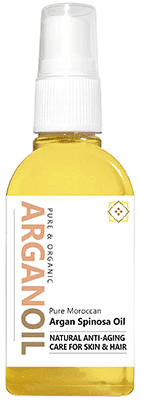Microbiomes: The Key to Healthy Skin
Why Bacteria, Prebiotics & Probiotics are Essential for Healthy Skin

Did you know that less than half of your body’s cells are actually made up of human cells?
The majority, about 57%, ( by cell count ) of you is a bustling ecosystem called the microbiome, composed of bacteria, viruses, fungi, and archaea!
The microbiome, also known as microbiota or skin flora, describes these microscopic organisms that peacefully coexist in your gut and on your skin.
While many are familiar with the gut microbiome (home to probiotics and “friendly bacteria”), the skin microbiome is equally vital. Together, these two microbiomes function like a major organ system, and their health is crucial for healthy skin.
To protect your microbiome, you’ll need to look at both your stomach and skin microbiota.[1]
Why Your Skin Microbiome Matters
The benefits your microbiota provides for your skin are simply irreplaceable by topical creams or vitamins alone. This intricate microbial community might just be the secret to managing or even curing stubborn skin problems.
Most importantly, both your gut and skin microbiomes directly affect the appearance and health of your skin.[0]
So, to protect your microbiome, you will need to look at both your stomach and skin microbiota.
What Does the Skin Microbiome Do?
A healthy skin microbiome is a protective barrier against skin infections and other common skin problems.
It maintains an acidic environment on the skin which controls the spread of bacteria such as Staphylococcus epidermidis, a root cause of many skin problems. In addition, a healthy microbiome is central to maintaining skin hydration and healing skin damage.
This is why you need to look after the microbiota in your gut and on the outer layers of your skin.
How to Heal Your Microbiomes

If you suspect your skin microbiome is damaged and want to heal it, you will need a comprehensive plan that covers both how you eat and how you look after your skin.
As we discussed above, look at your gut microbiota and review the products that you use on your skin.
First Protect Your Gut Microbiome
Diet
To improve your gut microbiome, look at your diet and supplements with prebiotics and probiotics.
- Eat prebiotic foods [57]
- Make sure you have fiber in your diet
- Eat a wide range of foods
- Gut flora love polyphenol-rich foods [49]
- Eat some fermented foods such as Kefir, Live Yogurts, and Apple Cider Vinegar [89]
- Avoid artificial sweeteners
- Be careful to take some preventative action when taking antibiotics
The Best Friendly Bacterial Strain for Skin Health
Probiotic Strains for Skin Health, Radiance & Resilience
The following probiotic strains have shown promising benefits not just for specific skin conditions, but for overall skin vitality, resilience, and anti-aging support:
-
Lactobacillus paracasei
Known for its immune-modulating effects, this strain can help reduce skin sensitivity, soothe irritation, and support the skin’s natural defense mechanisms — contributing to a calmer, more balanced complexion. -
Lactobacillus plantarum
Helps strengthen the gut-skin axis by supporting gut barrier integrity and microbial balance. This can reduce systemic inflammation, which is linked to premature skin aging, dullness, and reactivity. -
Lactobacillus rhamnosus
Its anti-inflammatory and immune-balancing effects may help improve skin tone and texture, reduce redness, and protect against environmental stressors that contribute to accelerated aging. -
Bifidobacterium infantis
Shown to reduce key biomarkers of inflammation in the body, this strain supports calm, nourished skin from the inside out — helping reduce flare-ups and support long-term skin health. -
Lactobacillus salivarius
Produces natural antimicrobial compounds (bacteriocins) that inhibit harmful skin bacteria, such as those linked to acne or irritation. It supports microbiome diversity, reinforces the skin barrier, and helps maintain hydration and firmness.
Specific Skin Problems & the Gut Microbiome
Dry Skin, Aging & Intestinal Disease Protection
In a 2014 study, rats given Lactobacillus brevis showed a significant decrease in transepidermal water loss. [24]
In 2014, a 12-week human study tested the effects of L. brevis SBC8803 supplements. Participants had significantly decreased skin water loss, and separate studies found big improvements in skin barrier function. Test subjects who took Lactobacillus paracasei supplements over a 2-month period had reduced skin sensitivity and water loss. [25]
Tests on L. helveticus also had very positive effects on skin moisturization levels. An article published in Science Translational Medicine presented a study where the gut microbiota of older mice was transferred into the gut of younger mice. [56]
The research revealed that this produced an increase in brain neuron growth and altered aging. There was also an increase in levels of butyrate, a fatty acid produced in the gut. This is significant because butyrate is suspected to be very important in the protection against intestinal and extraintestinal diseases. [49]
Eczema (Atopic Dermatitis) & Your Gut Microbiome
The root causes of this life-long problem are rooted in infancy and early childhood.
Not only is eczema closely connected to correct microbiome development, but research is now seeing how it influences other organs, such as the lung, brain, and skin. This possibly uncovers the common link between Eczema and Asthma, which often occur together.
Studies found that treatment of the gut with certain lactobacilli in mice significantly changes their overall skin phenotypes—a discovery that may well explain the results of studies into Staphylococcus aureus and Eczema (see below). [22] Other observations of patients with Atopic Eczema found a correlation between high levels of gut bacteria (Clostridia, Clostridium difficile, Escherichia coli, and Staphylococcus aureus) and lower than normal levels of Bifidobacteria, Bacteroidetes, and Bacteroides. [22][44]
- Lactobacillus rhamnosus (especially strains like GG and HN001): These are among the most studied probiotics for eczema. They’ve shown promise in:
- Preventing eczema development in infants at high risk.
- Reducing the severity of established eczema symptoms, including itchiness, in children and adults, likely by modulating the immune system (e.g., reducing Th2 immune responses).
- Bifidobacterium lactis (especially strains like BB12 and Bi-07): These strains have been studied for their ability to:
- Help prevent eczema in infants.
- Improve eczema severity and reduce inflammation.
- Bifidobacterium breve (especially M-16V): Shown to significantly decrease eczema severity and reduce inflammatory markers in infants with severe atopic dermatitis.
- Lactobacillus salivarius (e.g., LS01): As you mentioned, this strain has been clinically trialed and shown to help reduce symptoms of mild eczema, including itchiness, and reduce recurrence.
&nb sp;
Psoriasis & Your Gut Microbiome
Psoriasis is an autoimmune condition characterized by rapid skin cell turnover and systemic inflammation.
Studies found that people who have psoriasis of the skin or psoriatic arthritis have a less diverse range of intestinal bacteria. This also appears to be linked to a higher chance of getting irritable bowel syndrome and gut inflammation. [41]
A number of important bacterial types were present in lower than expected levels, including Coprococcus spp., Akkermansia, Ruminococcus, and Pseudobutyrivibrio. [42] To test these observations, a supplement-based therapy using Bifidobacterium infantis 35624 was administered to psoriasis patients over an eight-week period. [43]
The results of the study showed an increase in:
- C-reactive protein – produced in blood plasma in response to inflammation
- TNF-alpha – a cell-signaling protein involved in systemic inflammation
- IL-6 – an anti-inflammatory small protein
Acne & Your Gut Microbiome
Acne involves factors like sebum overproduction, inflammation, and the proliferation of Cutibacterium acnes bacteria. Probiotics can help by influencing these factors and improving gut health.
It is more than 70 years since dermatologists John H. Stokes and Donald M. Pillsbury suggested the connection between the gut microbiome, emotional states, and acne.
A study of 13,000 teenagers suffering from acne noticed that those with gastrointestinal symptoms and abdominal bloating were 37% more likely to have acne and other skin problems [35]. Initial observations noted that 40% of those with acne have hypochlorhydria, an excess production of hydrochloric acid in the stomach. [30] This increased acidity level affects the environment in which beneficial bacteria can flourish.
Unhealthy stomach acid production can lead to “small intestine bacterial overgrowth” [SIBO]. Specific studies into SIBO and acne vulgaris have not yet been made. However, other studies have shown that patients with acne rosacea are 10 times more likely to have SIBO.
As a treatment for acne, they proposed the use of organisms such as Lactobacillus acidophilus c and Bacillus acidophilus with cod liver oil — a probiotic.
- Lactobacillus acidophilus and Bifidobacterium bifidum: Some studies suggest these can improve skin barrier function and reduce acne severity.
- Lactobacillus rhamnosus (especially SP1 or GG): Has been shown to reduce acne lesions and improve skin quality, possibly by normalizing skin’s response to insulin and modulating gut microbiota and inflammation.
- Lactobacillus plantarum (e.g., CJLP55): Found to reduce breakouts by almost half in some studies, likely by influencing gut-skin communication and reducing inflammation.
- Lactobacillus salivarius: As discussed, its antimicrobial action against C. acnes and anti-inflammatory effects make it particularly relevant for acne.
- Bifidobacterium breve (e.g., BR03): Some blends for acne include this strain, which may support skin hydration and elasticity.
Rosacea & Your Gut Microbiome
Rosacea is a chronic inflammatory skin condition.
It is hard to treat because it does not respond well to most known skin treatments. A study of 50,000 Danish patients with rosacea showed that many types of intestinal disturbances were higher in patients with Rosacea. [2] Furthermore, studies found an improvement in rosacea symptoms occurred after eliminating a bacteria known as H. pylori. [3]
One important conclusion of the research was that people with gastrointestinal problems who also suffered from rosacea should be referred for an investigation into Helicobacter pylori infection (HPI) and small intestinal bacterial overgrowth. [4]
General Considerations When Using Probiotics
Live vs. Shelf-Stable (Non-Refrigerated) Probiotics
Live Refrigerated Probiotics:
- Usually have higher counts of live bacteria at purchase.
- Must be kept cold to maintain potency until consumption.
- Often have better survivability through the stomach acid, delivering more viable bacteria to the gut.
Shelf-Stable Probiotics (No refrigeration needed):
- Formulated to survive at room temperature by using hardy strains or special encapsulation.
- Convenient for travel and storage.
- May have lower viable counts or different strains optimized for stability.
- Effectiveness can be comparable but depends on formulation quality.
Choosing the Right Probiotic
- Match strains to your health goal (e.g., L. paracasei and B. infantis for psoriasis-related inflammation).
- Check CFU count (1 billion+ per strain is typical for effect).
- Look for multi-strain formulas for broader support.
Timing & Taking with Food
- Some studies suggest taking probiotics with food or just before a meal increases survival through stomach acid because food buffers the acidity.
- Fatty foods or fermented foods may help probiotics survive better.
- Kefir, yogurt, or bananas can provide prebiotics (food for the probiotics), enhancing colonization and effectiveness.
- Using Foods Like Kefir and Banana
- Kefir: A fermented dairy product rich in natural probiotics, including many Lactobacillus strains, which supports gut microbiome diversity and immune modulation.
- Bananas: High in prebiotic fibers (like inulin) that feed beneficial bacteria, helping probiotics thrive and improve gut barrier integrity.
- Combining probiotic supplements with prebiotic-rich foods can be more effective than either alone.
Other Tips
- Start with a lower dose if you’re new to probiotics to reduce any temporary digestive discomfort.
- Consistency matters: taking probiotics daily (or as recommended) helps maintain beneficial bacteria levels.
- Store probiotics as instructed (refrigerate if needed, keep away from moisture/heat).
- Keep in mind that probiotics are often adjuncts — diet, lifestyle, and other treatments play key roles in conditions like psoriasis.
- Oral vs. Topical: Many of these benefits are observed with oral probiotic supplementation, leveraging the gut-skin axis. However, topical probiotic or postbiotic (bacterial lysates/ferments) formulations are also gaining traction for direct skin benefits.
- Ongoing Research: The science of the microbiome is still evolving. While promising, more large-scale human studies are needed to solidify definitive recommendations for specific strains and dosages for each condition.
- Consult a Professional: If you’re dealing with a chronic skin condition, it’s always best to consult with a dermatologist or healthcare professional before starting any new supplement regimen. They can help you determine the most appropriate approach for your specific situation.

Daily Skin Care & Your Skin Microbiome
To improve your skin microbiome, look carefully at what you are putting on your skin and your cleaning regimen.
- Avoid Anti-bacterial washes or soaps!
- Avoid overwashing & Exfoliating
- Remember your skin should be slightly acidic. Consider PH balanced cleansers & Moisturisers
- Maintain Hydration Levels (Drink 2 – 3 litres of water per day)
- Choose clothes/material to allow your skin to breathe, not sweat
To put it simply, if your skin flora is not happy, then your skin will not be healthy.
Topical Probiotics and Prebiotics for a Healthy Skin Microbiome?
Can You Apply Pre-Biotics / Pro-Biotics Topically?
We see an increasing number of skincare products in our shops marketed as “probiotic-rich”. Could applying probiotics topically help improve your skin’s health?
Evidence suggests that your skin’s microbiome is an ecosystem home to at least a million bacteria per square centimetre, not to mention fungi, viruses, and mites! So, prebiotics and probiotics applied directly as part of a skincare routine should strengthen your skin’s ecosystem.
Prebiotics
Think of a prebiotic as food to feed your skin bacteria.
It is thought that foods containing high levels of Oligosaccharides that are rich in sugars support healthy skin bacterial growth. As it turns out, popular natural face mask ingredients — oats, barley, wheat bran, asparagus, banana, or honey — are foods rich in Oligosaccharides.
Probiotics, on the other hand, are sources that contain live bacteria to replace those lost. They are most commonly obtained from foods such as yogurt or kefir.
A Simple Prebiotic Face Mask
You can make a prebiotic/probiotic face mask with:
- 1 tablespoon plain full-fat yogurt / or kefir
- 1 tablespoon Argan Oil or Olive Oil
- 1/4 teaspoon honey
- 2 tablespoons prebiotic ingredient [Oatmeal or Banana or Avocado]
Instructions:
- Mix yogurt ingredients.
- Apply to face in small circles.
- Leave on for 10-30 minutes.
- Wash off with warm water
- Rinse with cold water
- Then gently pat dry with a towel
Moisturise Your Skin Gently
While diet is crucial, applying certain natural plant oils can complement your internal routine by supporting the skin microbiome externally.
There are many options. We, of course, recommend:
- Prickly Pear Seed Oil or Argan Oil.
Natural fibers (oils/extracts) present in prickly pear and argan feed the skin microbiome naturally, primarily as prebiotics.
They achieve this by:
- Providing Fatty Acids: These nourish beneficial skin bacteria and support a healthy skin barrier, creating a stable environment for the microbiome.
- Delivering Antioxidants: Compounds like Vitamin E and polyphenols reduce inflammation and oxidative stress, which helps maintain a balanced and thriving microbial community.
- Offering Hydration & Potential Prebiotic Sugars: They keep skin moisturized, and some extracts may contain oligosaccharides that directly feed beneficial microbes.
In essence, they provide a supportive, nourishing environment for the skin’s good bacteria to flourish.

Commensal Bacteria to Protect the Skin Microbiome
Commensal bacteria act like friendly roommates on your skin—they live there peacefully, help fight off intruders, and keep your skin healthy.
Only when they get out of balance (e.g., too many C. acnes) can problems like acne or infections happen.
Studies show that people with Psoriasis and Atopic Dermatitis have less Lactobacilli bacteria on the skin.
So, it appears there is quite a clear and direct connection between healthy skin bacteria and common skin problems.
In patients suffering from rosacea, the balance of microbiota in the skin has been disturbed.
This imbalance allows otherwise harmless microbes, such as the Demodex mite, to multiply out of control. [51] In fact, it has been found that inflammation of the skin in rosacea closely correlates with the density of mites on the skin. [58] The Demodex mites may also exacerbate the situation by making the skin more susceptible to common causes of inflammation like sunlight, alcohol, hormones, and other bacteria.
It has been shown that regular washing with alkaline soap reduced the Demodex mite population.
Eczema & the Skin Microbiome
Research in the U.S. uncovered a direct connection between Eczema flare-ups and a skin microbiome imbalance of bacteria Staphylococcus aureus.
They noticed that this bacteria was found in higher than normal concentrations on skin affected by Eczema. They also noted that there were lower concentrations of the cells that assist in building up skin barriers.
By increasing levels of other bacteria on the skin, the levels of Staphylococcus aureus were controlled, which prevented flare-ups. [10]
Acne & the Skin Microbiome
Disturbed bacterial colonies in the skin are thought to be the main cause of acne. [55]
A study of the skin microbiome in healthy patients and patients with acne found that although the levels of Propionibacterium acnes were similar in healthy and acne skin, certain “variant strains” were closely associated with acne skin and others with healthy skin.
A strain is a “genetic variant or subtype of a microorganism.”
1. Staphylococcus epidermidis
- Where it lives: All over your skin, especially on your face and arms.
- What it does: Protects against harmful bacteria & helps your immune system stay balanced.
- Example: It can stop Staphylococcus aureus (a more dangerous cousin) from growing.
2. Cutibacterium acnes (formerly Propionibacterium acnes)
- Where it lives: In your pores and around hair follicles, especially on oily skin (face, chest, back).
- What it does: Normally helps by keeping skin pH low and preventing bad microbes. But in excess, it can contribute to acne.
3. Corynebacterium species
- Where it lives: Moist areas like underarms, groin, and between toes.
- What it does: Helps shape your skin’s microbiome with some species helping to keep the skin’s surface healthy.
4. Micrococcus luteus
- Where it lives: All over the skin, especially exposed areas (like hands).
- What it does: May help break down sweat and oils.
How to Add Commensal Helpful Bacteria to the Skin—Probiotic Skin Therapy
1. Topical Probiotics
Creams, lotions, or serums containing live beneficial bacteria or bacterial extracts can be applied directly to the skin. These products aim to replenish good bacteria and support the skin’s natural defense.
2. Prebiotics for Skin
Prebiotics are ingredients that nourish and promote the growth of beneficial bacteria already on the skin. Examples include plant-based oligosaccharides or inulin, which can be included in skincare formulations.
3. Lifestyle and Hygiene Practices
Avoid overusing harsh soaps and antibacterial products that can kill beneficial skin bacteria. Use gentle, pH-balanced cleansers and moisturizers that support the skin barrier and its microbiome.
4. Diet and Supplements
A healthy diet rich in fiber and fermented foods may indirectly support skin microbiome health by promoting gut health, which is linked to skin health.
Ways to Add Helpful Bacteria to Skin
Yogurt or Kefir Mask
- Use plain, unsweetened yogurt or kefir (rich in live probiotics like Lactobacillus).
- Apply a thin layer on clean skin, leave for 10–15 minutes, then rinse with lukewarm water.
- The probiotics help balance skin flora and soothe irritation.
Fermented Oatmeal Mask
- Soak oats in water overnight with a bit of whey or yogurt to ferment slightly.
- Apply the fermented oatmeal paste to your skin for 15 minutes, then rinse.
- Oats are soothing, and fermentation adds beneficial microbes.
DIY Kombucha Toner
- Use plain kombucha (fermented tea with probiotics) diluted with water (1:1 ratio).
- Apply gently on the skin with a cotton pad as a toner.
- It can help balance skin pH and add good bacteria.
Homemade Prebiotic Serum
Mix a teaspoon of raw honey (which is a natural prebiotic) with a few drops of aloe vera gel.
Apply lightly to skin to nourish existing good bacteria.
Tips for DIY Probiotic Skin Care
- Use only fresh, live cultures (e.g., yogurt labeled with “live and active cultures”)
- Keep homemade products refrigerated and use quickly (within a day or two).
- Avoid adding anything harsh or synthetic, like anti-bacterial soaps, that might kill the bacteria.

Pure Argan Oil 2.03 fl oz
Pure double filtered Organic Argan Oil for a lighter Argan scent.
- 100% Pure Oil
- Certified Organic
- In Stock
- Quality Guarantee
- Free USPS 5-7 Day Tracked Shipping to U.S.
